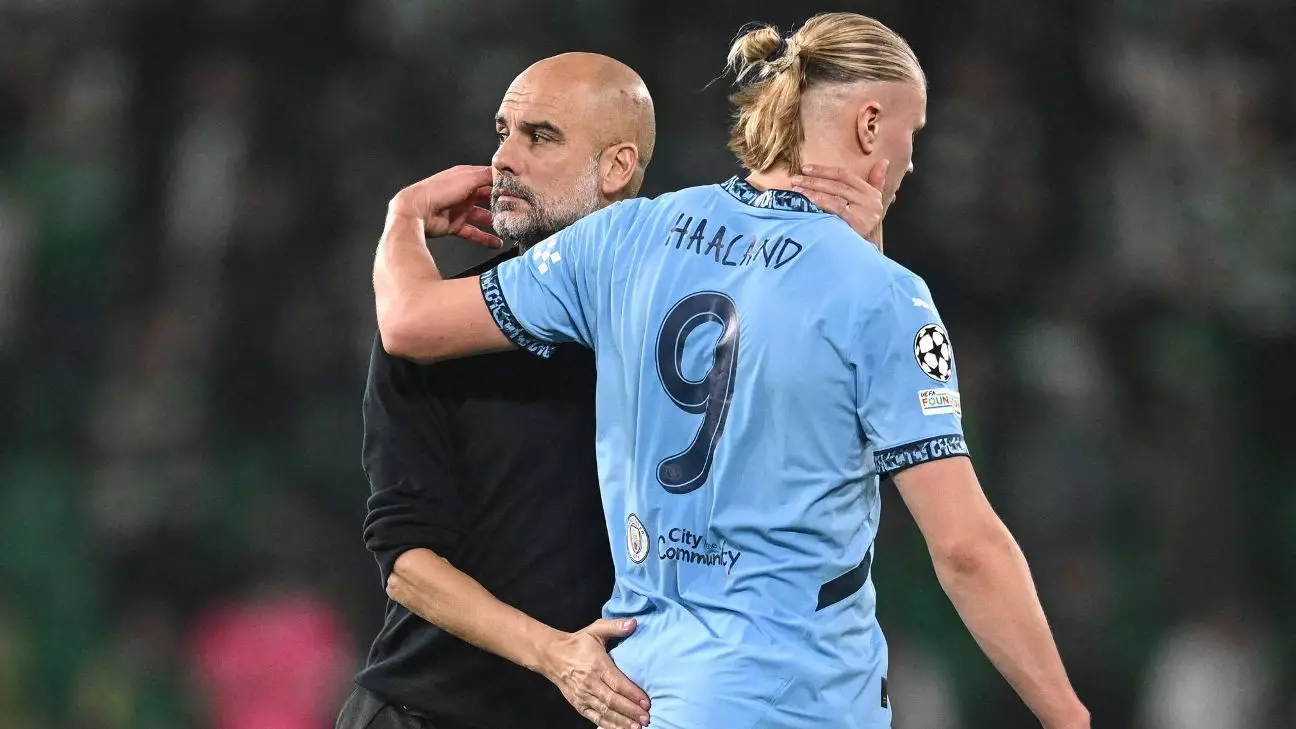Recent developments at Manchester City highlight a towering challenge that extends beyond the pitch. Manager Pep Guardiola’s two-year contract extension at the Etihad Stadium signals stability at the helm. Yet, the looming uncertainty regarding the futures of 16 first-team players with expiring contracts represents a complex web of decisions that the club must navigate before Guardiola’s tenure concludes in 2027. Among the notable names are stars like Erling Haaland, Kevin De Bruyne, and Jack Grealish, each facing a pivotal junction in their careers in a climate fraught with both internal and external pressures.
Underneath the surfacing euphoria of Guardiola’s extension lingers a pressing unease—specifically, the 115 charges of breaching the Premier League’s financial regulations that are still pending resolution. These allegations cast a long shadow over the club’s future and are intertwined with the on-field struggles. With an eight-point gap separating City from league leaders Liverpool, and a recent five-game losing streak that culminated in a troubling 3-3 draw against Feyenoord, the impact of these charges is palpable. The club’s history has been marked by triumphs, yet their current predicament poses a challenge not just for immediate performance but for long-term stability.
The impending hearings hold the potential for significant ramifications. Should the club face penalties—including hefty fines or a possible points deduction—it could dramatically alter the landscape of player negotiations. As it stands, a cautious atmosphere has enveloped the club, leading many players and their representatives to hesitate in committing to new contracts, which is crucial as the squad prepares for critical decisions about their futures.
An alarming trend arises from the looming contractual uncertainties—the lack of new deals finalized since the charges were articulated in February 2023. The extended discontent is reflected in how few first-team players have invested further commitment; the only exceptions being backup goalkeepers Stefan Ortega and Scott Carson. In comparison to competitors like Liverpool, who found themselves navigating similar issues with key assets nearing contract expirations—most notably Mohamed Salah and Virgil van Dijk—City must act decisively to avoid the possibility of losing top talent for nothing.
As 2027 approaches, City is confronted with the reality that several prized assets—including Rodri, Phil Foden, and Ruben Dias—will need priority attention, especially considering the potential implications of the ongoing legal matters. The prospect of entering negotiations whilst enduring this climate of uncertainty is likely to weigh heavily on the minds of these athletes and their teams.
The second half of the 2023 season sets the stage for crucial decisions—notably for Ilkay Gündogan and De Bruyne, both in the twilight of their careers and facing contracts that expire at season’s end. De Bruyne, specifically, expressed uncertainty regarding ongoing talks, highlighting the precarious position that seasoned players occupy. Meanwhile, a similar situation looms for an additional six players who will be out of contract by June 2026, necessitating expeditious negotiations to maintain competitive depth.
The broader implications of these contract negotiations are significant. Failure to secure extensions for key players not only jeopardizes Manchester City’s competitive stature; it also invites the potential for disruption of team chemistry and a broader question of the club’s ambitions.
Further complicating the situation is the anticipated transition in the club’s leadership structure. The departure of long-serving director of football Txiki Begiristain in favor of Hugo Viana from Sporting CP forecasts a pivotal change that could alter the club’s strategic direction. As long-term contracts are discussed and player futures determined, the implications of new leadership could set the tone for the club’s next phase.
Guardiola’s contract extension certainly provides a layer of clarity in terms of managerial commitment; however, it cannot obscure the fact that a stable management presence is no panacea for the larger issues at play, notably those surrounding player retention and contractual negotiations.
Ultimately, the lens through which one evaluates Manchester City’s trajectory will depend heavily on how they manage this convoluted phase. The juxtaposition of contract negotiations, looming legal challenges, and transitions in club leadership raises critical questions about the club’s capacity to maintain its status as a dominant force in football. The decisions made in the upcoming months will serve as a testament to not just the management’s foresight but also the resilience of the squad amidst adversity. For the supporters, the hope remains that their club navigates these turbulent waters and emerges ready to reclaim its crown both locally and on the European stage.

